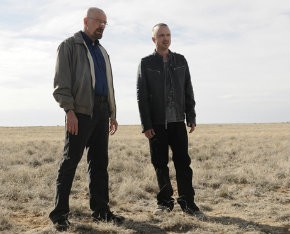Breaking Bad

In the second episode of season five of AMC’s hit television series Breaking Bad, Walter White, the show’s protagonist (played by Bryan Cranston), engineers a complicated ruse to convince Jesse Pinkman (Aaron Paul), his partner in crime—they cook and sell methamphetamine together—that he was not responsible for poisoning the son of Jesse’s girlfriend. But Walt did poison the boy in a calculated move to trick Jesse into turning against the area drug lord and their boss in an underground meth super lab. When Jesse is fully convinced of Walt’s innocence (the ruse is too complicated to explain here, but it involves a ricin-laden cigarette hidden in a robotic vacuum), he breaks down in sobs, horrified that he had previously threatened to shoot Walt. Walt strokes Jesse’s shoulders in a comforting, paternal way and tells him all is forgiven.
If this all sounds a bit complicated, it is. And not just in terms of the suspenseful plot twists involved in any good crime drama. Most complicated of all is the way the viewer is taken into the moral ambiguities of the show. As I watched Walt manipulate Jesse’s emotions and lie through his teeth about poisoning a child as part of his overall plan to murder a rival, I felt the thrill of Walt’s virtuosic rise to the top of the food chain, his masterful orchestration of people and events to his own ends, even as I gasped, “I can’t believe he’s getting away with it.” Each time Walt gets away with it (“it” is deceit, manipulation, physical violence, intimidation and murder), I can’t help cheering him on, while also shuddering at his depravity and my own emotional complicity in it.
This conflicted moral and emotional relationship to Walt is all the more pronounced because he didn’t used to be so bad. When the series starts, Walt is a middle-aged high school chemistry teacher who, when diagnosed with advanced lung cancer, stakes a desperate gamble on cooking methamphetamine with a drug-dealing former student to make money for his family before he dies. Before they have barely begun their enterprise, Walt and Jesse are plunged into the violence their new trade demands, and during the first season we watch Walt wrestle with the consequences of his actions. We’ve already given Walt our sympathies before we realize that he is consciously choosing to transform himself from a law-abiding, humble, conscientious man to a power-hungry, pride-driven, stop-at-nothing drug lord.




